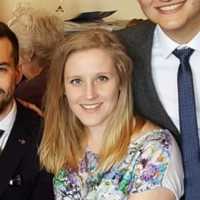Confessions of a Gunner: How not to be a wally on the ward
You've all met that person at medical school. First to put up their hand for everything and have a season ticket for the front row of the lecture theatre. But how does the 'Gunner' stay professional in the ward setting?
“And here, students, you’ll notice a rash on the patient’s face around their nose – it looks to me that this patient may have SLE…”
The respiratory consultant points a somewhat coincidental clinical sign out to his class, during a routine teaching session on pulmonary fibrosis. He is, however, unprepared for the chaos that is about to ensue.
“Actually Sir, that rash doesn’t spare the naso-labial folds so it appears that it’s much more likely to be rosacea, in my opinion.”
The student pipes up, a smug look painted across his face, which quickly melts away to become one of horror and shame as he realizes what he has done. The room turns to ice and the consultant just stares blankly. “Oh. Right. Moving on…” The other medics turn away in disgust and the student strongly considers leaping out the window to escape. No more free consultant coffee for him!
This is not an anecdote about a student I never liked at medical school. This, I’m embarrassed to admit, is a story about me. This is a confession of a ‘Gunner’.
A ‘Gunner’, for those not in the know, is a term used to describe a super keen medical student. You know the type: they’ll climb over everyone else to sit at the front row of the lecture hall, and classically suffer from Vitamin D deficiency having not seen natural, non-library light for the five year duration of medical school. In my defence, my time as a Gunner lasted only a few seconds before I realised the error of my ways. I simply wasn’t clever enough – apparently with the exception of random, useless dermatological tidbits.
This is not a blog written to demonise ‘Gunners’. Indeed some of those I’ve known have gone on to become the brightest and most impressive doctors of my year group. However, there are some behaviours undertaken by Gunners (AND non-Gunners, I hasten to add) which simply do not go down very well in a ward setting. Therefore, this could be considered a ‘Ward Safety Guide’ for medical students. It’s not hard to understand that a better relationship with ward staff and patients will lead to a better learning experience. You can play your part in that by avoiding some of the more ‘undesirable’ activities.
Firstly, remember to be professional everywhere in the hospital. The canteen is not a common room: staff members and even realtives lurk there and WILL listen to what you’re talking about. More than one medical student has been caught out by breaking confidentiality in the canteen!
Another important lesson that all junior doctors are aware of is that the allied health professionals - nurses, pharmacists and HCAs – are absolute life savers, both in the literal and figurative sense. They will get you out of a jam without a seconds thought and should be respected. In the same way, they can be brilliant to learn from as students. If there’s nothing to do on the ward, go and have a chat to the nurses and ask them if there’s anything you can help with. They’re much more likely to help sign you off for competencies if you engage as a team member.
Professionalism doesn’t just stop with confidentiality. It may sound basic, but use your common sense with what you wear. Bow ties are cool on Doctor Who… not on the ward. If you’re a senior consultant nearing retirement, perhaps you can pull off a bow tie. Maybe even braces and a pocket watch! As a medical student you’re making first impressions all the time, so dress for the occasion.
Lastly, do try not to correct the consultants. They’re certainly not perfect, and yes it is important that juniors question the decisions of their seniors to ensure the best care for their patients. However, even if you are right, do it in a more subtle way than blurting it out in the middle of a teaching session. It undermines that teacher’s lesson and makes you seem like you want attention.
So, to all the Gunners out there, and the mere mortals, the next time you spot a pathognomonic sign that you reckon everyone has missed: use that wisdom and tact that will make you a valued team member, and bring it up at the right time. Otherwise, you could find yourself turning from ‘smug’ to ‘mug’ in a matter of seconds. That free consultant coffee is too good to miss out on!




